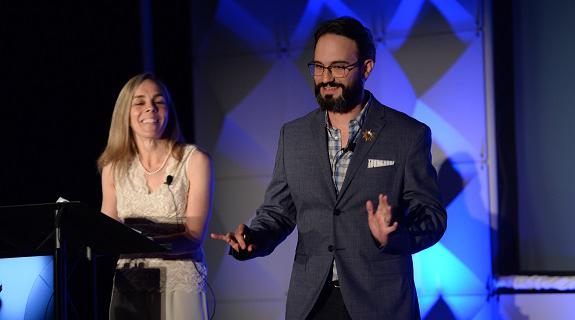Christine Shropshire, now creative director for brand image and editorial at The Food Network/Cooking Channel, was at one point frustrated that her hard work wasn’t being rewarded with promotions.
“I thought the workplace would be like school; you work hard, you get good grades, you get into a good college. It was a numbers game and I was good at it,” she shared during a Thrive: The New Leadership Playbook session at PromaxBDA: The Conference 2016.
Shropshire found that when she tried to play by those same rules in the workplace, she wound up watching peers get promoted while her own career trajectory stalled. So she sought the advice of an industry mentor who told her where she was going wrong: People who put their head down to work and think they will be noticed, are wrong.
So she, along with two of her PromaxBDA Thrive classmates, Amanda Wong, director of integrated partnerships for TruTV and Brian Hoffman, VP of creative strategy for NickToons, TeenNick, Nick Sports and The Splat, set out to interview various experts in self-promotion in hopes of applying that knowledge in their own careers.
What they learned along the way was that they had to ignore all the lessons they were taught in kindergarten: i.e., don’t stay in line; don’t follow the leader; don’t only speak when spoken to; don’t keep you head down; do question the rules; and bragging is OK.
What’s needed to be successful, Shropshire said, is a high emotional intelligence—in other words, the ability to recognize behaviors in yourself, your peers and your managers and use that information to provide appropriate input that will get you noticed.
In Shropshire’s case, she recognized that although she was very logical and tended to present her ideas in a logical manner, her manager was more emotional and didn’t always respond well to her pitches. So, when she got an idea she knew was risky but felt really passionate about, she decided to change the way she presented it—she acted it out in a dramatic interpretation and, to her surprise, her manager went for it.
Relationship building is also an important component of self-promotion. Hoffman learned this lesson from an anonymous source he likes to refer to as “James Bond.” Bond began his career as part of a local crime unit in New York City.
As Bond worked his way up through the ranks, Hoffman shared, he learned how important his relationships with his bosses, peers and informants were. “He saw how one failed alliance could unravel an entire case,” Hoffman said.
When Bond received a major promotion, he used the skills he had in relationship building to make the successful transition from fighting bad guys in the five boroughs to doing it on a global scale, all over the world.
“Relationships are still key to his winning formula,” Hoffman said. “While it’s important for him to understand different cultures, religions and languages, building trust is key to being accepted everywhere he goes, even in hostile environments,” Hoffman added.
Bond’s top secret advice for young professionals looking to promote themselves? “The opposite of networking is not working.”
Tags:













































__twocolumncontent.jpg)











